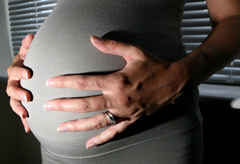Is it right to remove a disabled woman’s right to give birth?
Motherhood is a right of women across the world. But for one this week, the right to have children was almost taken away

Motherhood is a right of women across the world. But for one this week, the right to have children was almost taken away
A 21-year-old British woman with severe learning difficulties was assessed before the Court of Protection to see if she was capable of making decisions about long-term contraception, or if she should be forcibily sterilised.
During the hearing, the woman’s own mother broke down in tears and pleaded with Mr Justice Hedley to enforce the sterilization, claiming her daughter wasn’t capable of bringing up children and couldn’t support further babies.
The mother, known only as Mrs P, said: 'I want the best for my daughter. We are supporting and helping her to bring up her children and keep them together as a family unit. Obviously we can't carry on supporting more and more children. She doesn't see anything wrong in her behaviour. She doesn't have the capacity to realise about her actions.
'We need something done,' she continues. 'She fell pregnant with her second child quite quickly after her first and if it isn't done, the thing that worries me is that she'll fall pregnant again with her third.'
The judge decided that there was not enough evidence available to make a decision on an application that raised 'extremely serious and important' issues for the country, and so adjourned to a later date.
'Thirty or forty years ago, sterilizing women in this situation was almost routine, but it would be very unusual these days,' says David Congdon, head of campaigns and policy at Mencap, the charity for people with learning disabilities.
Celebrity news, beauty, fashion advice, and fascinating features, delivered straight to your inbox!
Campaigners fear the huge impact on the human rights of the disabled if this application is successful.
Should the government be getting involved with a woman’s right to have children? If the court agrees to this in the future, who is next? Marie Claire wants to hear your thoughts on this, so let us know by posting your comments below.